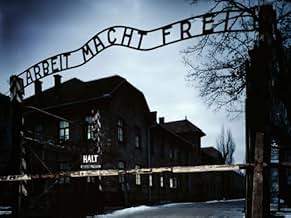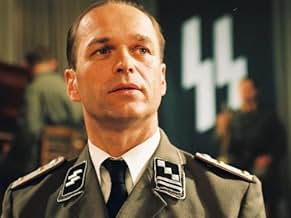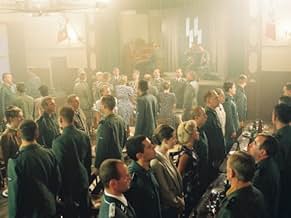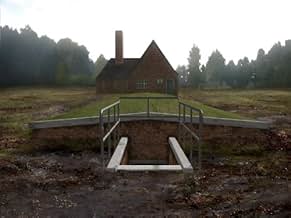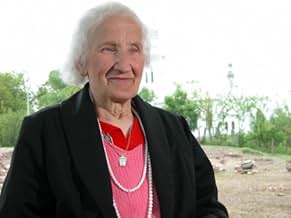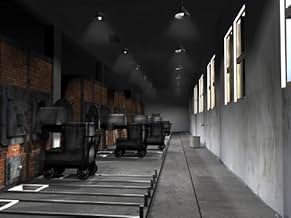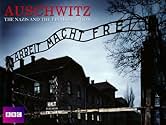Auschwitz: The Nazis & the 'Final Solution'
- टीवी मिनी सीरीज़
- 2005
- 48 मि
IMDb रेटिंग
8.6/10
4.7 हज़ार
आपकी रेटिंग
अपनी भाषा में प्लॉट जोड़ेंThe history of the Final Solution phase of the Nazi Holocaust, particularly with the most infamous of the death camps.The history of the Final Solution phase of the Nazi Holocaust, particularly with the most infamous of the death camps.The history of the Final Solution phase of the Nazi Holocaust, particularly with the most infamous of the death camps.
एपिसोड ब्राउज़ करें
फ़ीचर्ड समीक्षाएं
Sat through this entire 3-4 hours BBC documentary with 3D graphics to fully understand " the holocaust " horror . This masterpiece of fact compilation that is absolutely neutral , goes into every angle of subject visualization and authenticity has changed me forever . A must see for everyone to understand how thin are the lines that we draw , how delicate is the balance of peace and most importantly how the most intelligent , cultured humans can metamorphose to utter cruel worthless beasts , so that never ever something like this can happen here again !!!Amazing narratives , real photographs and visualization .Children should see this , do not prevent them from seeing the truth by raising some rating standards !!!
This is the story of the Nazi concentration camp of Auschwitz. We follow it from the very beginning in 1940 until its liberation by Russian troops in January 1945. We also get a glimpse of the aftermath in the form of the Nuremberg trials and we follow the destiny of central figures in the extermination of Jews, Gypsys, Russian POWs and political prisoners from mainly Poland. One of the most unpleasant aspects of this story is that some of the survivors of the camps has lead a miserable life after the war as they were not welcomed by various reasons when they returned home.
The series contains 6 episodes of about 45 minutes each. It is build up by interviews of former prisoners as well as a couple of guards. There is also extensive footage in the form of photography, film-clips and various documents.
In an attempt to make the story come more alive the producers have also hired German actors to play out the role of central figures in Auschwitz; Rudolf Höss, Adolf Eichman, Heinrich Himmler and Dr. Joseph Mengele to name a few. With the help of computer techniques the buildings of Auschwitz has been rebuild in order to get a view of how the camp looked like with specific attention to the gas-chambers and the barracks were the prisoners lived.
So a lot of work has been put into telling the story of one of the darkest chapters in human history. It is truly a depressing tale that leaves you with the big (and unanswered) question: how could this happen? And how can we avoid this happening again? For some reason BBC has chosen not to interview other than eye witnesses and therefore I personally was missing the explanation that a historian, sociologist etc could give to the phenomenon of Holocaust. As a psychologist myself I wondered about this; how can the combination of hatred and discipline be stronger than empathy with the prisoners? Empathy is not something that we choose but something that is always there. So how could those that were involved with the slaughtering of the prisoners not empathize with them? Maybe they did empathize with them after all - but empathy does not always lead to sympathy. It can also lead to sadism I think. Either way, the ability to empathize would dictate that the Germans were not unaffected by their actions which we also are told. Höss never liked the killings and especially in the beginning when it was done by shooting it made him uneasy.
One of the more controversial stories that are being told is that the allied forces refused to bomb the railroad-tracks leading to Auschwitz although they knew what was going on and although they were bombing IG Farben only 6 kilometers away. We have an eyewitness from Auschwitz telling us, that she saw the airplanes from the allied forces flying by and from an air photo of the camp we see that it is easy to identify the crematorium. Why didn't the allied forces drop a few bombs? This is really beyond me and makes me wonder if the allied had some sort of hidden agenda.
Another more controversial story is the story of the Hungarian Jews. The Germans apparently tried to bargain with their lives and wanted trucks in exchange of Jews. In a document from the allied forces we learn that it was seen as "blackmail" and that the allied forces saw a big problem in getting around 700.000 (I think) Jews to house and to feed. So the consequence was that they went straight to Auschwitz and the gas chambers.
Especially one interview with a guard by the name of Oskar Gröning is remembered; he is without remorse but decided to participate when he learned that theHolocaust by some people are being denied. The lack of remorse is interesting. It is tempting to understand the absence of this as a result of defense mechanisms at work.
I will not give this top rating as there was too much description and too little explanation. I also think that it was unnecessary to employ actors. A good narrative could have done the work instead. On the other hand you have the invaluable interviews with the eyewitnesses who will be dead and gone in a few years.
Regards Simon
The series contains 6 episodes of about 45 minutes each. It is build up by interviews of former prisoners as well as a couple of guards. There is also extensive footage in the form of photography, film-clips and various documents.
In an attempt to make the story come more alive the producers have also hired German actors to play out the role of central figures in Auschwitz; Rudolf Höss, Adolf Eichman, Heinrich Himmler and Dr. Joseph Mengele to name a few. With the help of computer techniques the buildings of Auschwitz has been rebuild in order to get a view of how the camp looked like with specific attention to the gas-chambers and the barracks were the prisoners lived.
So a lot of work has been put into telling the story of one of the darkest chapters in human history. It is truly a depressing tale that leaves you with the big (and unanswered) question: how could this happen? And how can we avoid this happening again? For some reason BBC has chosen not to interview other than eye witnesses and therefore I personally was missing the explanation that a historian, sociologist etc could give to the phenomenon of Holocaust. As a psychologist myself I wondered about this; how can the combination of hatred and discipline be stronger than empathy with the prisoners? Empathy is not something that we choose but something that is always there. So how could those that were involved with the slaughtering of the prisoners not empathize with them? Maybe they did empathize with them after all - but empathy does not always lead to sympathy. It can also lead to sadism I think. Either way, the ability to empathize would dictate that the Germans were not unaffected by their actions which we also are told. Höss never liked the killings and especially in the beginning when it was done by shooting it made him uneasy.
One of the more controversial stories that are being told is that the allied forces refused to bomb the railroad-tracks leading to Auschwitz although they knew what was going on and although they were bombing IG Farben only 6 kilometers away. We have an eyewitness from Auschwitz telling us, that she saw the airplanes from the allied forces flying by and from an air photo of the camp we see that it is easy to identify the crematorium. Why didn't the allied forces drop a few bombs? This is really beyond me and makes me wonder if the allied had some sort of hidden agenda.
Another more controversial story is the story of the Hungarian Jews. The Germans apparently tried to bargain with their lives and wanted trucks in exchange of Jews. In a document from the allied forces we learn that it was seen as "blackmail" and that the allied forces saw a big problem in getting around 700.000 (I think) Jews to house and to feed. So the consequence was that they went straight to Auschwitz and the gas chambers.
Especially one interview with a guard by the name of Oskar Gröning is remembered; he is without remorse but decided to participate when he learned that theHolocaust by some people are being denied. The lack of remorse is interesting. It is tempting to understand the absence of this as a result of defense mechanisms at work.
I will not give this top rating as there was too much description and too little explanation. I also think that it was unnecessary to employ actors. A good narrative could have done the work instead. On the other hand you have the invaluable interviews with the eyewitnesses who will be dead and gone in a few years.
Regards Simon
This is a superbly produced documentary, based largely on information that has come to light since information from the eastern bloc countries and former Soviet Union became accessible.
The documentary comprises mainly of interviews with surviving SS soldiers and surviving prisoners from the Auschwitz and similar camps. It uses CGI special effects, combined with film of the Auschwitz camps to achieve the most realistic reconstruction of how it looked, and how it operated. Dramatisations of various meetings and events have been authentically reconstructed with well cast actors.
The stories from the survivors, particular in the episode about children, are the most moving I've ever seen in a documentary. The combination of original photographs, moving music and a first hand account from a survivor make these stories most poignant.
It does not demonize the Nazi's, but gives in insight into the mentality that pervaded the regime. It shows them as lacking empathy. We see evidence that not only the Germans, but many French, many Hungarians and many Slovakians were only too willing to help deport their Jews; even the British Police, on the Nazi occupied Channel Islands, were willing to send Jews to the east. Finally, the documentary shows how the surviving Jews, or their return to their homeland, were treated badly by their fellow countrymen.
This documentary shows that what happened in the holocaust happened because humans, not just Nazi's, are capable doing terrible things to humanity, given a certain set of circumstances.
The documentary comprises mainly of interviews with surviving SS soldiers and surviving prisoners from the Auschwitz and similar camps. It uses CGI special effects, combined with film of the Auschwitz camps to achieve the most realistic reconstruction of how it looked, and how it operated. Dramatisations of various meetings and events have been authentically reconstructed with well cast actors.
The stories from the survivors, particular in the episode about children, are the most moving I've ever seen in a documentary. The combination of original photographs, moving music and a first hand account from a survivor make these stories most poignant.
It does not demonize the Nazi's, but gives in insight into the mentality that pervaded the regime. It shows them as lacking empathy. We see evidence that not only the Germans, but many French, many Hungarians and many Slovakians were only too willing to help deport their Jews; even the British Police, on the Nazi occupied Channel Islands, were willing to send Jews to the east. Finally, the documentary shows how the surviving Jews, or their return to their homeland, were treated badly by their fellow countrymen.
This documentary shows that what happened in the holocaust happened because humans, not just Nazi's, are capable doing terrible things to humanity, given a certain set of circumstances.
10olivbcn
Laurence Rees tells the most appalling story you have ever heard. Though the documentary is centred on the history of Auschwitz concentration and extermination camp, it also explains the Holocaust as a whole. 'Auschwitz' is made up of 4 elements: Dramatic reconstruction with native actors, high quality computer generated imagery, interviews of eye-witnesses, and astonishing archive footage. The actors play honestly their characters, and perfectly show the unforgivable and cold minded zeal of SS men. The interviews of (former?) Nazis and victims give a crucial human touch to this documentary. The BBC proves, one more time, that quality can go along with TV programme.
2005 was a good year for the BBC. They had Rome, they resurrected the Doctor Who franchise - but before all that, they created Auschwitz - The Nazis and the "Final Solution", which was, without doubt, their best WWII show yet. This harrowing account of what life was like inside the Nazi death camp uses real life footage, powerful and realistic dramatization sequences, and interviews with people who were there to create one of the most powerful mini-series ever broadcast on television. It shows the horrors of Auschwitz and other death camps in Germany and Poland to a generation who have never been forced to endure it, and uses the latest computer trickery to show to you the atrocious conditions in which the Jews lived. This is more than just a mini-series - it is a masterpiece, and lets everybody know that we are not to let things like this ever happen again. From the first to the final episode, I watched it with amazement, learning more and more about what happened in Europe over 60 years ago, and thinking "Why?". It is not the sort of thing you should watch for enjoyment - you watch it to remember those who died at Auschwitz, and think about their struggles and fears, and hope that no race ever treats another people like that ever again.
If you can see this show, do see it, as it is a harrowing, powerful, and well-researched tribute to the six million people who died because of the immense cruelty of the Nazis. A must-see. 10/10
If you can see this show, do see it, as it is a harrowing, powerful, and well-researched tribute to the six million people who died because of the immense cruelty of the Nazis. A must-see. 10/10
क्या आपको पता है
- ट्रिवियासभी एंट्री में स्पॉइलर हैं
- इसके अलावा अन्य वर्जनIn Spain, on January 29, 2005, a 104-minute cut was premiered on television. Hosted by the actress María Galiana, and with additional interviews to the Spanish survivors Jaume Álvarez, Enric Marcó and Neus Català. And co-produced by Sagrega TV, SA.
- कनेक्शनFeatured in Ein Tag in Auschwitz (2020)
टॉप पसंद
रेटिंग देने के लिए साइन-इन करें और वैयक्तिकृत सुझावों के लिए वॉचलिस्ट करें
- How many seasons does Auschwitz: Inside the Nazi State have?Alexa द्वारा संचालित
विवरण
- रिलीज़ की तारीख़
- कंट्री ऑफ़ ओरिजिन
- आधिकारिक साइट
- भाषा
- इस रूप में भी जाना जाता है
- Auschwitz: Inside the Nazi State
- फ़िल्माने की जगहें
- उत्पादन कंपनियां
- IMDbPro पर और कंपनी क्रेडिट देखें
- चलने की अवधि48 मिनट
- रंग
- ध्वनि मिश्रण
- पक्ष अनुपात
- 1.78 : 1
इस पेज में योगदान दें
किसी बदलाव का सुझाव दें या अनुपलब्ध कॉन्टेंट जोड़ें

टॉप गैप
By what name was Auschwitz: The Nazis & the 'Final Solution' (2005) officially released in India in English?
जवाब
